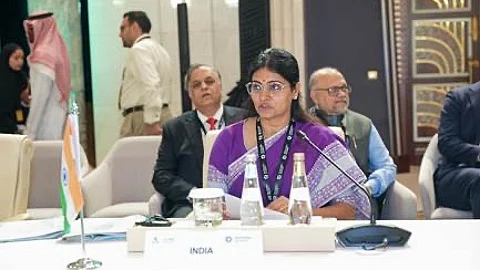

Union Minister of State for Health and Family Welfare, Smt. Anupriya Singh Patel, addressed the 4th Ministerial High-Level Global Conference on Antimicrobial Resistance (AMR) held in Jeddah, Kingdom of Saudi Arabia. The conference, themed "From Declaration to Implementation - Accelerating Actions Through Multisectoral Partnerships for the Containment of AMR," brought together global leaders to discuss strategies to combat AMR effectively.
Smt. Patel highlighted AMR as a critical global health challenge, necessitating a unified One Health approach. This perspective integrates human, animal, and plant health sectors while acknowledging the environmental factors contributing to AMR. She stressed the importance of cross-sectoral collaboration to foster robust policies and actions against this escalating threat.
India proposed a multifaceted strategy to strengthen AMR detection and surveillance across sectors. By leveraging data, India aims to promote evidence-based antimicrobial usage at local and national levels. "Antimicrobial resistance is a global health threat requiring urgent action through a One Health approach," she asserted.
Antimicrobial resistance is a global health threat requiring urgent action through a One Health approach
Smt. Anupriya Singh Patel
India has expressed support for the establishment of the AMR Multi-Partner Trust Fund and the creation of an Independent Panel on Evidence for Action against AMR by 2025. These initiatives, led by the quadripartite organizations—World Health Organization (WHO), Food and Agriculture Organization (FAO), World Organisation for Animal Health (WOAH), and the United Nations Environment Programme (UNEP)—aim to drive coordinated global efforts to contain AMR.
Recognizing the challenges faced by low- and middle-income countries (LMICs), Smt. Patel emphasized the need to address barriers to accessing and affording antimicrobials, diagnostics, and vaccines. This, she said, would ensure equitable healthcare outcomes for nations disproportionately affected by AMR. "India emphasizes equitable access to antimicrobials, diagnostics, and vaccines for developing nations," she remarked.
The conference culminated in the Jeddah Commitments, a series of resolutions aimed at transforming the UNGA High-Level Meeting's Political Declaration on AMR into actionable plans. Member states pledged to establish National AMR Committees comprising representatives from government, private sectors, and civil society. These committees will be tasked with implementing and monitoring National Action Plans (NAPs), gathering accurate data, and reporting into global surveillance systems.
A key focus of the Jeddah Commitments is the adoption of advanced technologies, including artificial intelligence, to enhance data collection and evidence-based policy-making. These innovations aim to streamline cross-departmental and sectoral collaborations within countries.
The conference underscored the critical role of the One Health approach in addressing AMR. By promoting synergy across human, animal, and environmental health, the approach seeks to identify and mitigate the root causes of resistance. This holistic framework emphasizes preventative measures, such as reducing the misuse of antimicrobials in agriculture and veterinary sectors, alongside ensuring judicious use in healthcare.
India emphasizes equitable access to antimicrobials, diagnostics, and vaccines for developing nations
Smt. Anupriya Singh Patel
The participating nations reaffirmed their commitment to AMR containment through enhanced surveillance systems and robust policies. This includes increasing access to diagnostic tools and promoting the development of new antimicrobials. A key element of the discussions revolved around the financial and technical support required for LMICs to bridge the gap in their healthcare infrastructures.
India's proactive stance at the conference highlights its dedication to global health security. By advocating for equitable solutions and leveraging data-driven insights, India aims to be at the forefront of the fight against AMR.
The conference concluded with a shared resolve to uphold the Jeddah Commitments, ensuring that the transition from declarations to tangible actions is both swift and impactful. This collective effort reflects a growing acknowledgment of AMR as not just a healthcare issue but a critical challenge to global development.
(Input from various sources)
(Rehash/Yash Kamble/MSM)
